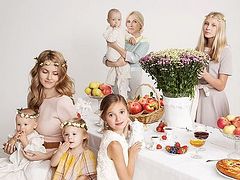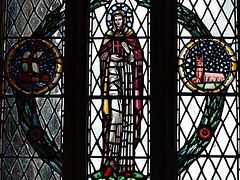Mother Christophora is the abbess of the Monastery of the Transfiguration in Ellwood City, Pennsylvania. She has been abbess there for over thirty years.
If you enter the Orthodox church, of course you will be struck by many things. You might notice that those who are serving the service, who are in the holy altar area are men—either the priest, perhaps a deacon with him, or even a bishop on the Sunday that you go to the church. There could be altar boys, or readers, or may be the cantors at the kliros. What is this? The men seem to do everything in the church. But I would like to call your attention to few other things that you might miss.
First of all, if you travel pretty much anywhere in the Orthodox world—in this country or another, to our church or monastery, or over the seas, to a great cathedral or a small country parish—and observe where the most candles are burning at any particular time. Probably, you’ll find the most candles burning in front of the icon of the Mother of God, the Theotokos icon. She is the one who is the mother of the Church, she’s the mother of us all. As we know, when Christ was dying in the cross, He said to His beloved apostle John, “Behold, your mother,” and to His mother, “Behold, your child.” At this point He gives all of us to her care. And how people really respond to that! If you go to an Orthodox home in this country or anywhere in the world, you will probably see an icon of the Theotokos, perhaps a prominent one. You will see where the love flows to and from. Many people feel that she understands us because she’s obviously a human being and she’s a woman.
In many ways, women have this gift from God to be understanding, to be sensitive, it’s a gift that we have from God. It’s a part of the gender, a part of God’s plan. He created the male and the female. Certain characteristics of male and certain characteristics of female are not restricted by some great line; there’s a blending always in each and every one of us. There should be a blending of these virtues and characteristics. But the woman has a spiritual great gift from God. One elder in Greece said that a woman is the one who bears a child, who with God brings new life into the world; she’s a co-creator with God. God has given a woman a great spiritual sense. There’s a gift there, there’s a sensitivity, intuition that women have.
If you are willing to take this mental journey with me, make this experiment yourself. Again, enter a church in this country—a big church, a small church, a city church, a country church, or go overseas—and count or take a mental photograph. Do you see in that church at any service more men or more women? Probably, you see more women. If you’re going to wager that, do it in that way. More likely than not you’ll be correct.
Our churches usually have women attending, women doing most of the tasks around the church. Now do we see that as some kind of degradation, some demeanor in the meaning of the female? I don’t think so. Christ accepted women, He loved them, He talked to the Samaritan woman, the Canaanite woman, the woman with the issue of blood. He was totally available. In His culture, in His time, that was not always acceptable behavior. And so, in the Church He waits for each of us, He plants the seed of His image in us; He created us, male and female, each of us in His image and likeness.
So, can a woman progress in spiritual life? Is it only the men? Because the men are the only ones who get ordained and the ones who serve the liturgy. Is it that women can only go so far and that’s it? I don’t think so. Women can be saints. Women must be saints. Women are saints. We in America, we, women, have a very high calling to become saints—that’s what that nation needs. What does it need more than a saint? Does it need another physician? Well, perhaps, there’re always people needing medical help. But many very talented, educated people become good doctors and nurses. Do we need another teacher? Do we need another social worker? Do we need another politician? There’s always somebody. But what will strengthen this nation? What will strengthen the Church in this nation but women saints?
More of us are taking our calling seriously to become more and more like God, to become closer to God, to know Him and to be doing His will. We have tremendous opportunities as women and there are no barriers to this. Visit a women’s Orthodox monastery. It’s fantastic in the sense that clearly this is a matriarchal society. It is women living with women, putting up with women and doing everything that’s asked of them. So, the whole monastic community, the whole monastery, the women’s monastery is very much in the hands of the nuns. There is no man who could come here and tell us how to live our lives. We have the blessing of our bishop, we have his prayers, and we have his watchful eye. I’m sure if there is anything inappropriate, he would come in and make correction of that. But he’s not here to make decisions for us, to set down any rules beyond what the Church itself gives us. We have priests who come, who love to serve in women’s monasteries, especially retired priests. We have had quite a happy history of retired priests serving here for a while. It’s a very good opportunity for them because they no longer have responsibility for the parish, but they still love to serve. If God gives them continued health, they enjoy serving, they want to serve, but they can come serve the liturgy, enjoy some fellowship with the nuns or some of our guests. But they don’t have to worry about who’s making the prosphora, who’s going to light the censor, who’s going to be there for us.
In women’s monasteries, we don’t have altar boys or sub deacons; we have nuns who serve in the altar. That might be interesting to you. It was to me. I was raised in the Orthodox Church, and as a little girl, we understood very well that girls don’t go in the altar. I was about twenty-five when I first visited the monastery, and I have to say when I saw a nun coming out of the altar, my heart skipped a beat. I thought, “My goodness! What’s going on?” But then, of course, I realized that it would be necessary. It’s very practical, the Church is very practical. So, in a women’s monastery, if someone is going in the altar to help the priest by lighting the censor or handing him things, or boiling the water, or cleaning, or whatever—this is done by the nuns.
This is not without a blessing—not just any nun can go in the altar. We preserve the altar as a very respected place. Not just any man can go in the altar either—only those who have to can go in the altar. It’s not some place we go to hang out or just prove the point that women can go there. It’s a special obedience in the monastery. The blessing of the abbesses is that this nun or this nun will serve in the altar. And she’s taught how to do it and has to do it respectfully. Of course, in a women’s monastery, we do all the reading and the chanting, as in many of our parishes. We have that opportunity.
The life of a woman in the Church is the ultimate, the fullness. This applies even to a mother. Look at the mother of a family, raising her children. First of all, to bear children. God asks you to give birth to His children and then to raise them. Every moment for fifteen or twenty years, the mother is the priest at home, the priest to that child. She’s giving him complete spiritual guidance and upbringing—emotional, physical, educational, but also spiritual. So, your prayer life, your intimate relationship with God is passed onto your children. You’re praying for them; you are their total connection with God. They are too young to speak, to say their prayers, even too young to make the sign of the cross. We love watching children making the sign of the cross. They are one or two years old. They sort of hit their head, tap their chest with their fingers, they know there’s something there to do, but slowly the mother takes the hand of the child and shows how to hold the three fingers, and how to put two down, then to touch the forehead, and the heart, the chest, and each shoulder, teaching the child little by little to come to God or kiss the icon, or to receive the Holy Communion, to be respectful when they go to the chalice. This is a fantastic role in the Church. It’s the ultimate role—to be a mother. You might think as an abbess I have a great spiritual authority. I only have as much authority as a sister will allow me to have in her life, but the mother of a family is everything to an infant, to a baby—everything they receive is coming through you, through your hands, through your breath, through your prayers. This is the greatest thing. You’re not only becoming a saint to yourself, but you’re also raising up saints for the Church, you’re raising up perhaps priests for the Church or even a bishop; even monks and nuns, or singers. This is a wonderful gift, a wonderful thing that God asks us to do as women.





